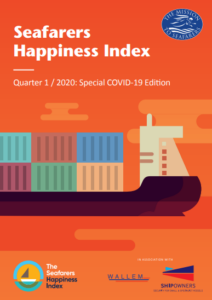Seafarers’ happiness has been lower for the first quarter of 2020, with clear concerns about current safety and welfare provision for those serving at sea during the COVID-19 crisis, according to the latest Seafarers Happiness Index report. Seafarers are urgently calling for improved connectivity between shore and sea and the need for greater support across the industry during this unprecedented time.
The latest Seafarers Happiness Index, published today by The Mission to Seafarers in association with the Shipowners’ Club and Wallem Group, focused on the impact of COVID-19 and areas, such as workload, social interaction and shore leave, where its effects are being felt most keenly.
However, as much of the data for this quarter precedes the onset of the pandemic, The Mission anticipates seeing its impact on crew reflected further in responses for the next quarter.
In particular, the report revealed overall seafarer happiness dropped to 6.30 in Q1 2020, down from 6.39 in Q4 2019.
It is paramount that industry calls for seafarers to be recognized as key workers are acted upon and that we support those who are maintaining our global supply chains. Protecting our seafarers is key to protecting our industry. It is our duty and responsibility to provide them with all the tools needed to be safe, particularly while many are prevented from returning home,
…Steven Jones, Founder of the Seafarers Happiness Index, commented on the occasion of the report release.
The key takeaways formed as follows:
Limited shore leave taking its toll
Responses regarding shore leave show that seafarers are not being able to benefit from welfare facilities ashore, which in turn hugely impacts their mental wellbeing.
Even when shore leave is possible, the cost of shore passes, access to transport and health fears can impact the decision to go ashore.
Meanwhile, given ships are reduced to minimum crewing levels, taking shore leave requires cover, forming further issues regarding logistics.
Many seafarers are prioritizing completing their contract and getting home rather than getting ashore when in port, further emphasizing the need to ensure vessels are suitable places to spend extended time.
Growing workload and contract extensions
Additionally, results indicated that crews are experiencing growing workloads, particularly exacerbated by COVID-19 restrictions.
There is a sense of detachment between ship and shore, with numerous criticisms about the way in which work and expectations are managed and the need to keep vessels to “hospital standards” of hygiene, with the relentless struggle to keep vessels virus free.
Growing concerns over seafarer health and wellbeing
Across all responses, the call from seafarers was clear. The combination of increased workloads, extended contracts and increased isolation leaves the majority of seafarers feeling stressed, anxious and exhausted. This risks undermining the quality of their work and safety standards.
Concerns included poor connectivity and shore staff boarding vessels given the risk of infection.
The industry has a responsibility to ensure seafarers are and feel protected and safe within the workplace.
Still a sense of pride
While this report highlights the increasingly heavy workloads and social tensions on board some vessels, it was also clear that there is pride in the work they do.
Now more than ever, it is paramount that the industry puts seafarers at the heart of their decision making, ensuring vessels are put in lay-up in locations that have internet access and ports can open, where possible, to allow access to seafarers’ centres.
-Workload: 5.69 ↓ from 5.89
Seafarers are beginning to report greater levels of fatigue and burn out, as they are forced to keep on working without a sense of when they might be heading back home on leave.
Seafarers reported having to keep vessels to “hospital standards” of hygiene, and they reported an ongoing and relentless struggle to ensure their vessels remain virus free. Scrubbing, hosing, and wiping are the new constants of daily life.
-Interaction with other crew on board: 7.13 ↑ from 7.09
Although there was a small increase in happiness levels for interaction with fellow crew, the comments gave definite indications of increasing tensions onboard. Stress and uncertainty can exact a terrible toll on seafarers.
Life onboard is one of a delicate balance and harmony, and where this is impacted social tensions can easily rise. Seafarers reported that concerns about the safety and wellbeing of family at home, and doubts about when or if they themselves will return, are having a negative effect on relationships onboard.
-Shore leave 5.80 ↓ from 5.90
The issue of shore leave and of getting time away from the vessel is one which has proven problematic across previous Happiness Index reports.
Put very simply, seafarers are not happy with the barriers they face when trying to have much-needed and deserved time away from the vessel.
Explore more herebelow:































































